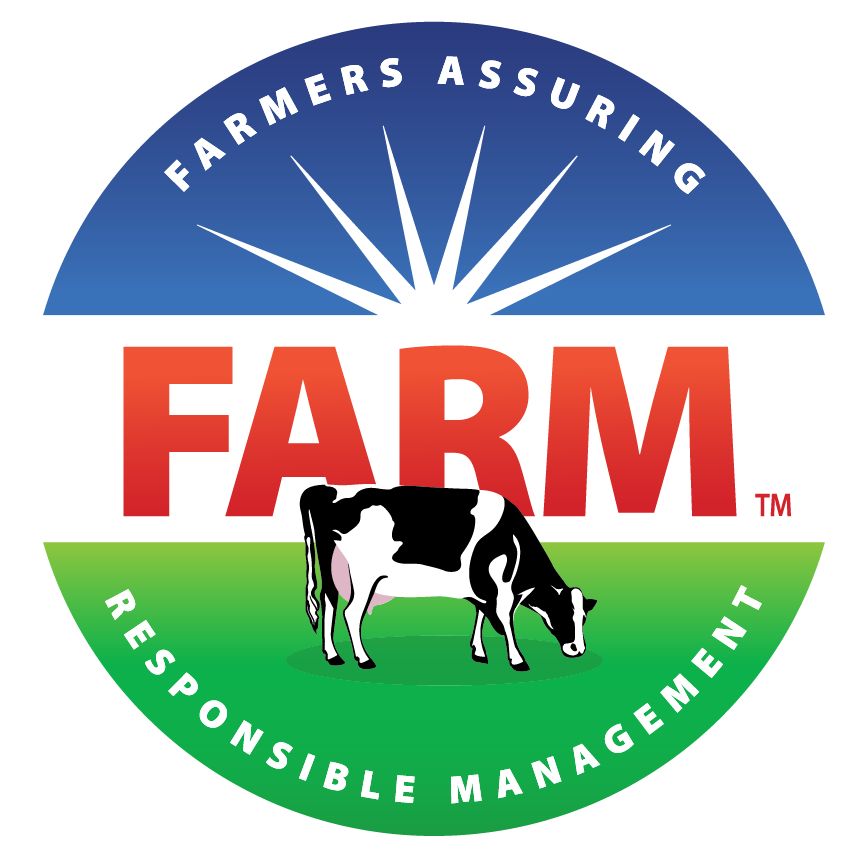FARM Environmental Stewardship Version 3
The FARM Environmental Stewardship Program regularly reviews and incorporates new science to (1) ensure robust and reliable results and (2) meet expanding interests and needs of farmers and FARM Program participants. Programmatic updates and accountability measures are governed by the FARM Environmental Stewardship Task Force, the National Milk Producers Federation (NMPF) Environmental Issues Committee, and the NMPF Board of Directors with input from industry stakeholder groups including farmers, researchers, academics, FARM Program participants and more. Dairy Management Inc’s (DMI) environmental research team leads scientific research to keep the model current with the latest scientific advancements. DMI staff regularly collaborates with researchers from leading academic and research institutions, both domestically and internationally. The FARM Program is currently in the process of facilitating the development of FARM Environmental Stewardship Program Version 3, focusing on a scientific update to the greenhouse gas model that powers the tool in collaboration with DMI and the Innovation Center for U.S. Dairy.
High-Level Description and Timeline
NMPF, DMI and the Innovation Center for U.S. Dairy collaborated to update the greenhouse gas (GHG) model that powers the FARM Environmental Stewardship Program. When FARM Environmental Stewardship Program Version 3 launched in October 2024, FARM Environmental Stewardship Program transitioned to a “process-based” model through work with Ruminant Farm Systems (RuFaS) – an initiative involving researchers from across the country focused on environmental modeling of dairy farms.
Shifting to a process-based model offers several benefits for addressing customer requests while offering more insights to farmers and FARM Program participants:
- A more robust and accurate model while remaining practical and easy to use
- Farm-level environmental insights through scenario analyses to support informed decision-making about the adoption of practices and technology
- Increased functions to enable farmers, cooperatives and processors to work with supply chain customers interested in investing in on-farm interventions and GHG reductions.
Key Efforts
On-farm model testing
- FARM worked with the RuFaS team to facilitate testing of the model on over 30 dairy farms across the United States to ensure it works well for varying production styles and geographies. At the completion of the testing process, FARM hosted feedback sessions for participants to discuss the data collection and evaluation process to gain insights on how FARM ES Version 3 can be best implemented.
Creating a farm-friendly user-interface
- Over the course of two years, the FARM and RuFaS teams worked closely together with their software developers to integrate RuFaS into the FARM database. A key piece of this effort was to incorporate stakeholder inputs from Cohort 2 and the FARM ES Version 3 Working Group.
Training
- FARM created six self-paced, online learning modules to prepare evaluators for conducting on-farm evaluations. Evaluators must complete the training annually to remain certified to conduct Version 3 evaluations.
- To complement the online training, FARM worked with ACER Consulting to establish optional, advanced training sessions dedicated to specific modules within the FARM ES Version 3 evaluation.
Resources
- FARM released the Version 3 User Guide, providing key information about the RuFaS model and its integration into the Version 3 evaluation tool.
- The FARM ES Version 3 Prep Guide helps farmers and evaluators prepare for a Version 3 evaluation, highlighting best practices for data collection and results interpretation.
- FARM also released Data Collection Sheets to support on-farm implementation of Version 3.
Ongoing feedback
- FARM ES continues to collect feedback via the Evaluation Feedback Form and various stakeholder groups.
Integrating RuFaS Updates
- As the RuFaS model advances, FARM ES will work to integrate updates over time.
Working Group Meetings
The FARM Environmental Stewardship Program Version 3 Working Group is composed of farmers, evaluators and co-op/processor staff to provide key stakeholder feedback and a sounding board for the research team. The Working Group has met regularly since Q2 of 2022. The Working Group meetings have been an opportunity for these stakeholders to provide input on topics such as:
- Recruitment of farmers for model validation
- Management options for scenario analyses
- Data inputs to use in the basic version of the FARM Environmental Stewardship Program versus those to fill in with default values
- Desired software functionality
Additional stakeholder input will be solicited through feedback session.
Working Group Members
Antone Mickelson
Northwest Dairy Association
Ashley Warren
First District Association
Austin Allred
Royal Family Farming
Brandon Clark
United Dairymen of Arizona
Brian McGarry
McGarry Dairy
Casey Storey
Tillamook County Creamery Association
Darrin Soares
Hilmar Cheese Company
Deborah Gingrich
Michigan Milk Producers Association
Dixie Martinho
California Dairies, Inc.
Ed Oppedyk Jr
Edward Oppedyk Dairy, LLP
James Weber
Weber Family Dairy
Janae Klingler
Maryland & Virginia Milk Producers
Jed Davis
Agri-Mark, Inc.
Jen Millican
Stotz Dairy
Jim Biddle
Mill Hill Farms
Kayla Rink
Dairy Farmers of America, Inc.
Kristy Miron
Land O’Lakes, Inc.
Mike Machado
Glanbia Foods, Inc.
Rachel Turgasen
Foremost Farms USA
Sandy Larson
Larson Acres
Travis Fogler
Stonyvale Farm
Communications
Wide stakeholder engagement and awareness are key to the successful development of FARM Environmental Stewardship Program Version 3. In addition to the materials linked below, the FARM Program has delivered presentations about Version 3 to the following groups: the NMPF Board of Directors, the NMPF Environmental Issues Committee, the Innovation Center Environmental Stewardship Committee, the Innovation Center Stewardship Commitment Committee, the FARM Farmer Advisory Council and the FARM Environmental Stewardship Task Force.
